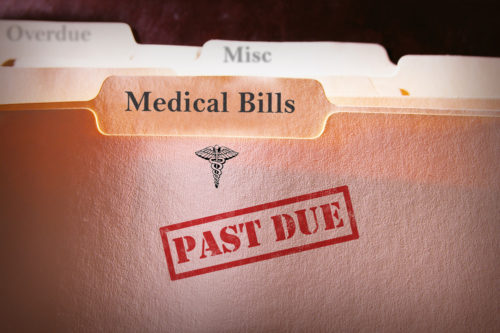Medical bankruptcy is not a legal term — it’s a situation in which medical expenses are financially overwhelming and crippling for a family or individual. Filing for bankruptcy can help an overwhelmed individual get rid of several debts, including medical bills.
According to a Gallup survey, Americans borrowed an estimated $88 billion over the last year to pay for healthcare. Mounting medical debt causes many consumers great concern — 44% of individuals said that the “impact of [medical] bills on their families has been major.”
Ignoring growing medical debt will damage your credit and create undue stress in your life as debt collectors seek payment. Healthcare spending is expected to keep rising, so it’s best to know what medical debt relief solutions are available in case of a serious illness. Bankruptcy could be a good option since medical debt is as eligible for discharge as other debts like credit cards and personal loans.
Table of Contents
Does Bankruptcy Clear Medical Debt?
Although medical debt bankruptcy is not an official form of financial relief, filing for bankruptcy can help clear your medical bills. Student loans, credit card debt, and a mortgage are other examples of debt that are considered in the petition.
Filing for bankruptcy just to clear your medical debt should be reevaluated — the bankruptcy process will affect your credit score for up to 10 years and may jeopardize your home and other assets. It’s best to learn more about Chapter 7 and Chapter 13 bankruptcies and consult with an attorney to determine what you will gain — and lose during the medical bankruptcy process.
When considering a medical bankruptcy, ask yourself if you need the total liquidation and debt forgiveness you could obtain from a Chapter 7 bankruptcy, or a restructuring of the debt through a Chapter 13.
While you may receive total debt forgiveness using a Chapter 7 petition, your assets, such as your home, vehicles, and valuables are on the line. Chapter 13 protects your assets, but the process is long — expect to remain employed as you make monthly payments for three to five years. Read more about the impact of filing bankruptcy, by Chapter type.
Filing a Chapter 7 Bankruptcy to Discharge Medical Debt
Chapter 7 bankruptcy is the simplest and most common form of bankruptcy, but you must give up and sell your non-exempt property. Any medical debt, including medical bills charged to your credit cards or paid for with a loan or line of credit, can be included in a Chapter 7 bankruptcy.
On one hand, filing for Chapter 7 gives you immediate medical debt relief as creditors halt their collection attempts when you file. The petition takes just a few months from start to finish; you can be clear of your overwhelming medical bills as soon as three months after you file.
On the other hand, you may lose your home or other property since you must turn your assets over to pay off your creditors. Getting your medical bills discharged may affect your relationship with your doctor. Hospital emergency rooms must legally treat you regardless of your ability to pay, but a private doctor’s office could deny you care if you don’t pay your outstanding medical bills.
Filing a Chapter 13 Bankruptcy to Clear Healthcare Bills
Chapter 13 is the second alternative for medical bankruptcies. If your medical condition doesn’t affect your ability to work and you have a regular source of income, this option may be best for you. Instead of discharging all your debt, you can restructure it by setting up a three-to-five-year payment plan, depending on your income.
After restructuring, you’ll make monthly payments based on what will be affordable for you. Once you complete your repayment plan as agreed, your remaining debt will be discharged. Your assets, such as your home and vehicle, won’t be at risk as long as you make your payments each month and you’ll be in better standing with your doctors than if you filed a Chapter 7, since it’s likely you’ll be paying them back.
A major drawback is the change in your lifestyle — all disposable income must go toward your debts during the long repayment period. The bankruptcy trustee will monitor you regularly and can ask the court to dismiss your case if you don’t comply with the requirements of your repayment plan.
Impact of Filing Bankruptcy
As you can see in the bankruptcy comparisons above, there are bankruptcy-specific advantages and drawbacks to filing for bankruptcy by type. General positive aspects for both types of Chapter filings include:
- Your overwhelming debts are forgiven;
- You get to hit the reset button on your financial troubles;
- You can stop aggressive bill collectors;
- You will get rid of high-balance credit cards;
- You’ll have access to credit counseling, which can help you avoid future medical debt;
Drawbacks to filing for bankruptcy to resolve healthcare debt include:
- You’ll have a lower credit score for seven to 10 years;
- You could experience problems when you’re trying to borrow money because of a negatively impacted credit history;
- There will be a public record of the bankruptcy;
- The potentially high cost of filing and attorney fees;
- You will subject your personal life and spending habits to scrutiny;
Alternative Options to Medical Bankruptcy
When medical bills balloon past what you can afford to pay, medical bankruptcies are a viable option. Filing for medical debt bankruptcy comes with serious and long-lasting consequences that shouldn’t be taken lightly. There are alternative options to bankruptcy to help you preserve your credit and get back on track.
Get Credit Counseling
Meet with a nonprofit credit counselor who can get a good grasp on your financial situation, help you set up a budget, and organize a debt management plan with your creditors. The U.S. Trustee Program has a list of approved credit counseling agencies you can check. Although counseling can be helpful, it may not be enough to pay down overwhelming amounts of medical debt.
Negotiate With Your Medical Creditors
If you’re unable to cover your hospital or physician medical bills, contact them right away. A willingness to directly working with your healthcare providers to meet your obligations could open up other options such as medical bill discounts, an interest-free repayment plan, or a longer repayment plan. When negotiating, don’t make promises to your creditors you can’t keep or you may further complicate your issues.
Turn to Charities
There are many medical debt resources available that could help you by paying a portion of your medical bills. In most cases, it may be too late to reach out long after the medical debt was incurred. Consider reaching out to the following organizations and charities the moment you realize you can’t afford to pay your medical bills:
- Your hospital: Many hospitals offer “charity care” by providing low- to no-cost medical care.
- Your state’s Department of Human Services: Also known as Health and/or Social Services, they may have programs like Supplemental Security Income, Medicaid, Temporary Assistance for Needy Families, or the Catastrophic Illness in Children Relief Fund in Massachusetts.
- CancerCare Copay Assistance Foundation: They help patients cover the cost of treatment drugs and chemotherapy and have helped 180,000 people each year pay their insurance co-payments.
- Leukemia & Lymphoma Society: They provide financial help for copayments and insurance premiums to qualified patients.
- Patient Access Network: Helps patients cover the out-of-pocket costs to treat many life-threatening diseases. Their website has daily updates on the financial availability of its programs.
Image Source: https://depositphotos.com/





